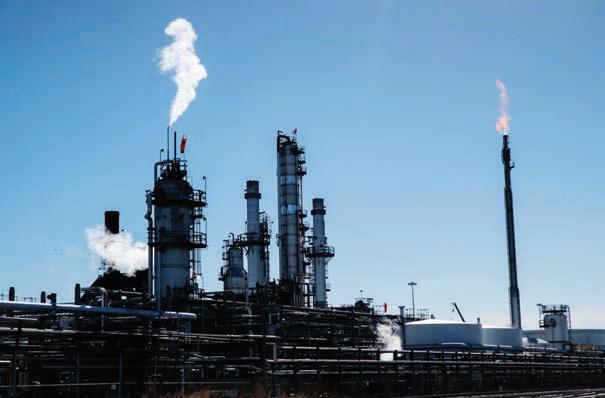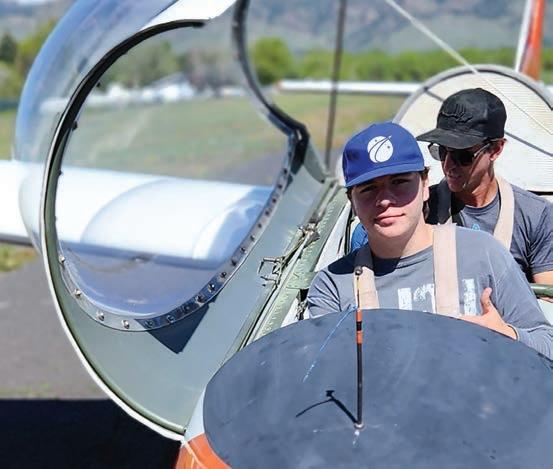
3 minute read
EPA again blocks air pollution permit for Suncor
BY MICHAEL BOOTH THE COLORADO SUN
e EPA’s Denver regional o ce is once again blocking a renewed state air pollution permit for the Suncor re nery in Commerce City, agreeing to objections from environmental groups that Colorado should crack down harder on carbon monoxide dangers and past plant modi cations.
Suncor has had numerous air and water pollution violations in recent years, and the regional Environmental Protection Agency had its own objections to Suncor permit renewals last year, ordering the state to make changes. After Colorado issued revisions, neighbors and environmental groups had the chance to make new objections.
While Suncor’s Plant 2 will be allowed to continue producing petroleum products for Colorado and the region, state air pollution o cials must now “resolve EPA’s objections” based on the environmental groups’ two petitions “before issuing a revised permit.”
“Improving air quality for the underserved communities a ected by harmful air emissions from the Suncor re nery is a shared priority for EPA and CDPHE,” said EPA Regional Administrator KC Becker. Becker is the former Democratic Speaker of the House for Colorado, and has placed an emphasis on carrying out environmental justice initiatives while at the EPA.
“EPA will continue to work with Colorado to secure the re nery’s compliance with laws and regulations and protect the health of nearby residents,” Becker said.
Representatives of the environmental groups welcomed the new scrutiny on Suncor, which has been releasing excessive levels of danger- ous materials like benzene, PFAS “forever chemicals,” sulfur dioxide and more into the air and water of south Adams County and north Denver. ey have demanded intensi ed state scrutiny of the re nery as it seeks permit renewals, and some have called for the outright closure of the sprawling plant, the only petroleum re nery in Colorado.
“We’re grateful the EPA is taking the concerns of community and community-based organizations seriously, but nes aren’t working with these people,” said Ean Tafoya, director of the nonpro t Colorado GreenLatinos, one of the petitioners.
“We’ve said for a very long time Suncor continues to be out of compliance, and enforcement isn’t enough, they just keep paying to play. It’s time for us to begin planning the closure of Suncor.”
“We are happy that the EPA took an important step toward holding Suncor accountable for its toxic air pollution,” said Ian Coghill, senior attorney with Earthjustice. “For too long, impacted communities have su ered at the hands of the re nery and the state has failed to hold it accountable. is must result in the state taking a meaningful look at Suncor’s permitting and nally reining in its pollution.” e EPA’s demands in e ect reset the clock on assessing Suncor’s expired permit, which has been under scrutiny for years. Depending on how much the Colorado Department of Public Health and Environment rewrites the Plant 2 permit, the EPA said, “the revisions may involve additional public notice and com- have another 60-day petition period to make new objections. e EPA’s order directs Colorado ofcials to “evaluate whether additional operational requirements are needed to assure compliance with carbon monoxide and opacity limits at the plant’s uid catalytic cracking unit. It also directs CDPHE to determine whether previous plant modi cations were analyzed properly.” e EPA’s 99-page summary of its partial agreements with the petitioners appears to lean toward new standards for Suncor, Tafoya said. Environmental groups want the state to require technology upgrades at Suncor that would prevent leaks, including demands to use the “best available technology.”
Coloradans managed while the entire re nery was shut down for repairs early in 2023 after a re, Tafoya said.
“ e local economy survived. We’re grateful we have these tools and the EPA appears to be listening,” he said.

Suncor rst sought to renew the Plant 2 permit in 2010. e state allows some industries to keep operating under expired permits, and says it enforces the requirements of the old permit in the meantime.
State air pollution o cials said they were “closely reviewing” the EPA’s decision to grant parts of the petitions to the permit. “ e division will decide how to proceed after its review of the EPA’s decision and documentation,” said a spokesperson for the Air Pollution Control Division.
Given months of news about benzene, sulfur dioxide and other hazardous material releases, Tafoya said, “GreenLatinos wants to have a meeting with the state about cumulative violations.” e EPA announcement said “one petition was led by Earthjustice on behalf of the Elyria and Swansea Neighborhood Association, Cultivando, Colorado Latino Forum, GreenLatinos, Center for Biological Diversity and Sierra Club. e second petition was led by 350 Colorado.” e 350 Colorado petition was denied, the EPA said, but many of the objections in the petition led by Earthjustice were validated. is story is from e Colorado Sun, a journalist-owned news outlet based in Denver and covering the state. For more, and to support e Colorado Sun, visit coloradosun.com. e Colorado Sun is a partner in the Colorado News Conservancy, owner of Colorado Community Media.
Under the U.S. Clean Air Act, the EPA sets regulations on air pollution limits, and state o cials carry out the permitting, inspection and enforcement on the companies receiving permits.
“EPA is also supporting community-based air monitoring and stateled e orts to investigate and address noncompliance issues associated with air emissions from the Suncor plants,” the EPA o ce said.











